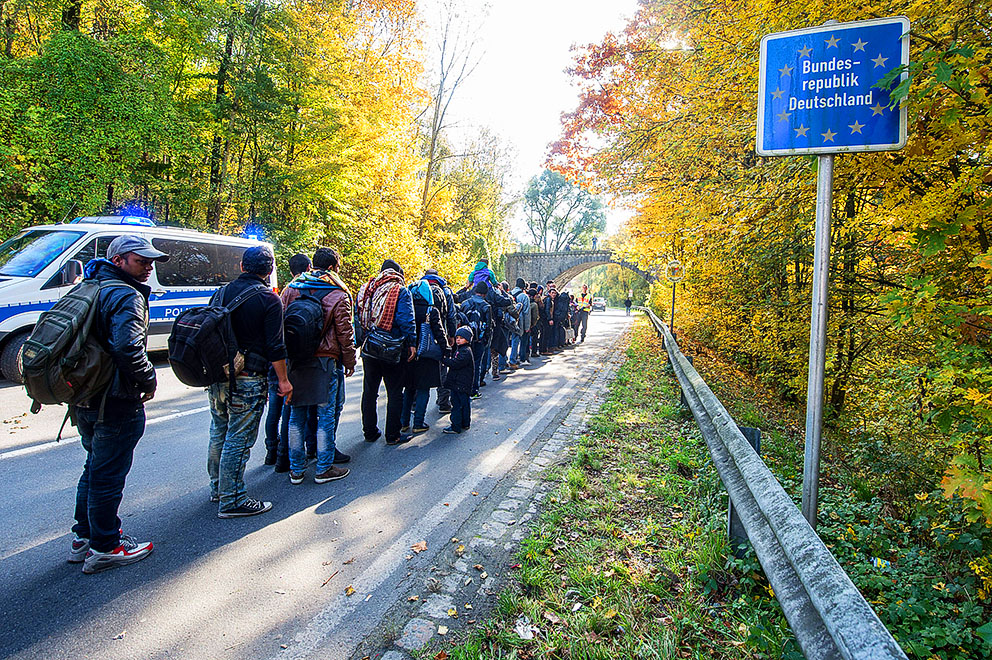As recently as last month, Austria was considered Germany’s last true friend. But with chaos flaring on the border in recent days, sections of the German media are portraying Germany’s southern neighbour as yet another nation that acts selfishly or bows to pressure from right-wing populists. German authorities have been overwhelmed by the arrival of thousands of refugees in buses from the Slovenian–Austrian border, where the situation has also been tense (as it has been at the border between Slovenia and Croatia).
Around 2000 refugees broke through police barriers on Monday and crossed into Germany near Passau in the southeast of Bavaria. The Bavarian state government has accused the Austrians of conveying people arriving from Slovenia as speedily as possible to the German border, without checking whether they would like to claim asylum in Austria and without informing German officials about where and when buses will arrive. Several roads have been closed to normal cross-border traffic.
Since last Saturday, refugees have been entering Germany at a similar rate to arrivals in the first half of September, after Angela Merkel and Werner Faymann agreed to suspend border controls. But accurate figures are hard to come by. The Bavarian government claims that at least 270,000 refugees entered Germany via that state’s border with Austria in September, but the Federal Office for Migration and Refugees registered 163,000 arrivals that month. The discrepancy is partly explained by the fact that many new arrivals have not yet been registered, but the Bavarian government might also be exaggerating the numbers to put pressure on the German chancellor.
The latest official estimate of how many irregular migrants will arrive during 2015 dates from the second half of August, when interior minister Thomas de Maizière said that Germany could expect up to 800,000. Even though refugee movements increased in September, the federal government has yet to update that figure. In early October, newspapers reported that the German authorities were confidentially anticipating up to 1.5 million new arrivals in 2015; the government has neither confirmed nor denied that figure.
If the official estimate of 800,000 is correct, then Germany will receive about as many new arrivals, per capita, as Austria (which has a population of 8.6 million and is expecting about 85,000 arrivals in 2015). But both countries might end up accommodating far fewer refugees per capita this year than Sweden, which has a population of just under ten million and is anticipating 190,000 new arrivals.
Not every refugee crossing the Austrian–German border is going to add to the load carried by Germany. Many Syrians, in particular, are heading for Sweden because it has suspended individual refugee status determination procedures for Syrians and also has a generous family reunion policy. Several large tents in front of Hamburg’s central railway station are testament to the fact that up to a thousand of the refugees entering Germany at present are only passing through: the tents accommodate new arrivals who have come to Hamburg because it is Germany’s gateway to Scandinavia.
Germany’s federal, state and local governments fervently hope that the rate of new arrivals will fall over the remaining two months of 2015. But that’s unlikely to happen because of a change of circumstances in refugee-producing countries; in fact, analysts believe that the Syrian government’s Russian-backed military offensive around Aleppo will only accelerate the exodus from what is by far the largest individual source country for refugees in Europe. Instead, the number of arrivals will depend on the success of three sets of policies: tough new measures for asylum seekers whose protection claims are, or are likely to be, unfounded; the fortification of Europe’s external borders; and the fair distribution of asylum seekers and refugees across Europe.
Earlier this month, the German Bundestag passed legislation – the Asylverfahrensbeschleunigungsgesetz, which follows hard on the heels of a similar bill passed in early July – making it easier to remove people whose applications for asylum have been rejected. The new law is partly designed to remove alleged incentives for people whose protection claims are unlikely to succeed. During their initial stay in temporary accommodation, for example, asylum seekers receive an allowance of €143 per person per month; under the new law, the states can provide some of that assistance in kind – by issuing asylum seekers with bus passes, say, and deducting the value from the allowance. Because of the administrative expenses involved, however, only Bavaria has so far decided to trial the new provision, and to do so only with a select group of people from the Western Balkans.
Asylum seekers from that region, which accounted for almost 30 per cent of new asylum applications in the first nine months of this year, are considered to have little chance of being allowed to remain in Germany. Albania, Montenegro and Kosovo have been declared safe countries of origin, which allows faster processing of nationals of these countries. Under the new legislation, nationals of “safe” countries who have submitted their asylum claims after 1 September are also no longer permitted to work.
Yet expectations that the Asylverfahrensbeschleunigungsgesetz would result in the immediate departure of large numbers of failed asylum seekers – possibly in planes provided by the air force – have proved unrealistic. And even if the numbers were to rise significantly, the revised policy would initially target people who arrived months, if not years, ago. The states would still need to provide accommodation for new arrivals, and the removals (which are also a state responsibility) are likely to tie up resources and personnel needed to provide reception services. In some cases, too, failed asylum seekers can’t be removed because the European Union hasn’t concluded return agreements with their countries of origin.
Angela Merkel’s most strident critic since early September has been Bavaria’s premier Horst Seehofer, leader of the state’s Christian Social Union, sister party to Merkel’s Christian Democrats. Seehofer has demanded even tougher measures to deter asylum seekers, prevent them from entering Germany, and remove them quickly should their claims be unfounded. He wants to establish “transit zones” along the border with Austria where new arrivals from the Western Balkans and other countries declared safe could be kept until their asylum claims have been processed. Transit zones at German airports, where asylum claims can be processed quickly and failed applicants can speedily be removed, are the model. Having initially rejected Seehofer’s idea, Merkel has now embraced it. She knows, however, that her coalition partner, the Social Democratic Party, is opposed to the scheme, and that its implementation is almost impossible, unless of course Germany decides to follow Australia’s example and imprison asylum seekers on their arrival (which, at this point, appears unlikely).
Merkel’s hope that the European Union would agree to a fair distribution of refugees and asylum seekers across Europe has proved illusory. Five countries are still carrying the bulk of the burden: Italy and Greece, the first ports of call, and Austria, Sweden and Germany. Britain and most of the Eastern European member countries remain firmly opposed to a quota arrangement; and all the other members, including France, have been most reluctant to implement the agreement reached earlier this year to move 160,000 arrivals from Greece and Italy to other European countries. By the end of last week, nine European countries had committed to resettling only a total of 854 of the 160,000 and, of those, only eighty-six had actually been moved: about half to Sweden and the other half to Finland.
Turkish president Recep Tayyip Erdoğan has sought and received substantial concessions from the European Union and Germany in return for his country’s assistance in stemming the flow of refugees to Greece. Merkel, who had always been adamant that Turkey shouldn’t become a full member of the European Union, has even signalled that she might support a speeding up of the accession process. But Turkey has so far done very little to prevent refugees leaving for nearby Greek islands, and that is unlikely to change until well after the Turkish elections this Sunday.
So there is little prospect that any of the three sets of policies will be particularly effective in slowing or halting arrivals. Only the onset of winter and a decision by Croatia and Slovenia to follow Hungary in physically excluding refugees could significantly reduce the number of people entering Austria, Germany and Sweden.
At the end of August, Merkel proclaimed, “Wir schaffen das” (“We are able to do this”). She repeated that sentence throughout September and in the first half of October, but over the past couple of weeks she has been less confident and emphatic. As early as 12 October, she qualified her mantra by adding “aber wir schaffen das nicht alleine in der Welt” (“but we won’t be able to do this all by ourselves”).
Across Germany, mayors and other local political leaders had already decided that the challenge was too daunting – unless, of course, it were possible to stop more refugees from entering Germany. Many of the local politicians who have declared that the capacity of their city, town or shire is exhausted are Christian Democrats. But they also include Social Democrats and members of the Greens. Two weeks ago, for example, Lutz Trümper, the mayor of Magdeburg, the capital of the East German state of Saxony-Anhalt, left the Social Democratic Party in protest at the federal government’s refugee policy. Earlier this week, Boris Palmer, a prominent member of the Greens and mayor of the university town of Tübingen in the West German state of Baden-Württemberg, claimed that in many respects Germany had reached the limit of its capacity.
Germany is conveying contradictory impressions. On the one hand, the newspapers are full of reports about local and state authorities struggling to cope: shortages of beds, shortages of buildings that could be used to accommodate new arrivals, shortages of teachers, social workers and police. The evening television news shows large numbers of people crossing the Austrian–German border or being accommodated in tents.
On the other hand, life goes on as if the mass arrivals had never happened. Walking around Passau earlier this week, I was struck by how comfortable people seemed to be. This is the town closest to where tens of thousands of people were entering Germany from Austria. For the Germans catching the late October sun on one of the benches along the rivers Inn and Danube, or having their coffee and cake in one of the town’s many cafes, nothing had changed. No refugees were evident in Passau’s mall or in the town’s pretty parks; in fact, many of the town’s residents would never have met a refugee. It’s no different in other places in Germany – or Austria, for that matter.
At a town hall meeting in Nuremberg this week, Angela Merkel agreed with her audience that Germany was accommodating “very, very many” refugees, only to add, “But there are eighty million of us.” That doesn’t match the experience of the 102 people of Sumte, a tiny village in the east of Lower Saxony, where a vacant former office block is being converted into accommodation for 1000 refugees. But it is the experience of most Germans, whose everyday lives are barely being touched by the mass arrivals.
For a country of eighty million, 800,000 new arrivals are a lot to cope with. But who else could cope with this kind of challenge as comfortably as Germany can? To meet the additional costs the federal government has been able to draw on a healthy budget surplus. Finance minister Wolfgang Schäuble believes that it will be possible to balance the budget next year as well, although by the end of 2015 the additional annual costs will probably have amounted to more than €10 billion for the federal government alone. According to Germany’s Office for Labour, September’s unemployment rate was a record low of 6.2 per cent. According to the International Labour Organization’s methodology, the rate is an even lower 4.5 per cent. Either way, Germany is performing better than any other European country; France’s rate is more than twice as high, and Spain’s about five times.
Is Germany able to do this? Of course it is. It will be able to house a million refugees – or two million, for that matter. It will be able to provide decent accommodation, language courses and, once the new arrivals have learnt some German, jobs. It will master the logistical challenges involved. But that’s only part of what is now meant when Germans ask, “Schaffen wir das?” (“Are we able to do this?”)
For many Germans, schaffen involves more than food and accommodation. It means providing these necessities in an orderly manner after refugees have been registered on arrival, and it means that asylum claims are processed quickly. It is obvious that this is not yet the case. Many, if not most, of those who have arrived since August have not yet been able to lodge an asylum claim. Once they do, they have to wait for months before they learn of its outcome. The distribution of new arrivals across Germany is still chaotic. Local authorities often hear of the impending arrival of hundreds of refugees only a few hours in advance; they frequently don’t have time to prepare emergency accommodation in gymnasiums, get hold of enough camp beds and bedding, and find caterers able to provide food.
Merkel knows that order needs to be restored quickly, and in recent weeks she has often said this is her first priority. Restoring order doesn’t matter too much for the many volunteers who are welcoming refugees, helping out, or accommodating them in their homes. Neither does it matter much for those who would like to send all refugees back to where they came from. But Merkel needs to convince the silent majority – who for the past ten years, during Merkel’s long reign, were promised that life could always be free of turbulence – that order has been restored, and she needs to do that very soon.
The question “Schaffen wir das?” also means: will Germany be able to deal with the arrival of hundreds of thousands of refugees without a return to the anti–asylum seeker hysteria of the early 1990s? Will Germans continue to vote for moderate parties and shun extremists, or will the populist far right, which is still comparatively weak, gain in strength? Will Germany soon have its very own Marine Le Pen or a political leader as successful as Austria’s Heinz-Christian Strache?
“Kippt die Stimmung?” (“Is the mood going to change?”) Commentators have been asking this question for weeks. Literally, kippen means “topple” or “tip” – a sudden turn much like a change of weather during the summer months in Melbourne. The metaphor suggests that a change of mood could be sudden, and that it could have catastrophic consequences. I suspect that while observers are waiting for a sudden radical change, they have missed the fact that much has changed already. In Saxony, Germans opposed to the arrival of refugees are already in the majority. There, and in other parts of East Germany, it is already considered normal for local politicians to say that their communities can’t possibly be expected to accommodate more than a handful of refugees, for locals to form picket lines to prevent refugees from gaining access to buildings designed to accommodate them (as happened recently in Übigau in the East German state of Brandenburg), and for far-right extremists who try to attack asylum seekers physically to be applauded by a not-so-silent majority (as happened last week in Freiberg in Saxony).
Much has changed since the days in early September when Munich residents welcomed refugees arriving at the city’s central railway station from Hungary. The naive enthusiasm of six weeks ago has gone. That’s not such a bad thing.
The outcome of the current developments is not yet a foregone conclusion. Deutschland könnte es noch schaffen; Germany might still be able to do this. It’s true that resentment and hatred dominate in some parts of East Germany. But civil society groups supporting refugees have formed in many areas in which local government, state and federal agencies are struggling, including in Saxony. It’s not only the far right that is gaining in strength, so too are the groups that want Germany to be able to do this. It is still possible that the silent majority will choose to identify with the project of accommodating and successfully integrating hundreds of thousands of refugees, rather than with attempts to intimidate or assault them. But it is also possible that those who are fearful of or feel resentful towards refugees will come to believe that there is nothing wrong with venting their anger. •




